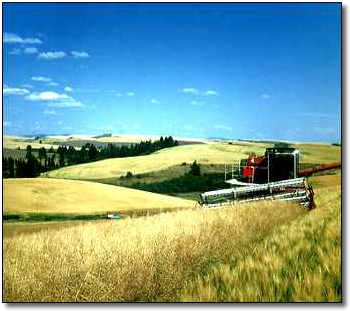
April 14, 2005
Shown here, rapeseed is a source of both canola oil and biodiesel fuel. This farmer can sell his harvest for food or energy. An expanded Renewable Fuels Standard will boost biofuels production of biodiesel.
Photo: NREL

|
April 14, 2005 Shown here, rapeseed is a source of both canola oil and biodiesel fuel. This farmer can sell his harvest for food or energy. An expanded Renewable Fuels Standard will boost biofuels production of biodiesel. Photo: NREL |
At a time when cuts to the farm bill are being
considered, this new, more ambitious RFS proposal represents a beacon of hope
for rural America."
- Brian Jennings, Executive Vice President of the The American Coalition for
Ethanol.
Representatives Tom Osborne (R-NE), Stephanie Herseth
(D-SD), Collin Peterson (D-MN), and Steve King (R-IA) introduced The Fuels
Security Act of 2005. The measure mirrors the Senate version of the Renewable
Fuels Standard found in S. 650, which was introduced last month by Senators
Harkin and Lugar, and sets a national renewable fuel standard of 4 billon
gallons by 2006 and 8 billion gallons by 2012. The target would more than double
the current production numbers.
The bill also contains an escalation clause that allows the renewable fuel
requirement to be expanded beyond the life of the schedule based upon an overall
review of the program. Finally, the legislation provides an important foundation
for establishing ethanol plants in new regions of the country that are expected
to produce ethanol from non-traditional cellulosic feedstocks.
The original Renewable Fuels Standard, introduced four years ago, called for 5
billion gallons of ethanol to be used annually by 2012. With ethanol production
in the U.S. increasing at a rate of over 600 million gallons per year and the
industry poised to produce 4 billion gallons by 2006, enacting a more ambitious
schedule for ethanol demand will better reflect the current growth of the
industry.
If enacted, this legislation will spur production of biofuels in all regions of
the country that use a variety of feedstocks, and stimulate investment and rural
economic development.
"Ethanol production in the U.S. is expanding at a remarkable rate, with
most of the growth led by farmer- and locally-owned ethanol facilities. At a
time when cuts to the farm bill are being considered, this new, more ambitious
RFS proposal represents a beacon of hope for rural America," said Brian
Jennings, Executive Vice President of the The American Coalition for Ethanol.
At a time when the U.S. trade deficit in February reached a record $61 billion,
two thirds of the increase in imports was attributed to petroleum and petroleum
products, according to the DC-based Environmental and Energy Study Institute (EESI).
In 2004, $166 billion of the U.S. trade deficit was from oil imports alone.
At a press conference led by Rep. Herseth, Members outlined other benefits a
shift from petroleum to biofuels could have for the country. Rep. Herseth said
the rapid adoption of a national renewable fuels standard was a "national
issue with growing support."
Rep. Tom Osborne discussed some potential wide-ranging impacts of the
legislation: a $51 billion increase in income to farmers, the significant
decrease in farm payments that will result, the $200 billion that will be added
to U.S. GDP, and the overall 20 cent decrease per gallon of gasoline due to the
adoption of ethanol blends. He emphasized that this legislation is not just
geared for farmers, rather, "it certainly benefits every American."
Rep. Mark Kennedy asked, "How high do our energy prices need to get, before
we act? How long will we let our trade deficit grow before we do
something?" Certainly, the current price per barrel of oil hovering above
$57 begs that precise question.
Original co-sponsors of the bill include: Representatives Marion Berry (D-AR),
Earl Pomeroy (D-ND), Sam Graves (R-MO), Leonard Boswell (D-IA), Betty McCollum
(D-MN), Ike Skelton (D-MO), Mark Kennedy (R-MN), Marcy Kaptur (D-OH), John
McHugh (R-NY), Jeff Fortenberry (R-NE), Jerry Moran (R-KS), Jim Leach (R-IA),
Jim Ryun (R-KS), Ted Strickland (D-OH), Tom Latham (R-IA), Ray LaHood (R-IL),
Julia Carson (D-IN), and Mike Pence (R-IN).
Copyright © 1999 - 2005 - RenewableEnergyAccess.com
Please visit www.RenewableEnergyAccess.com for great coverage on energy today!!